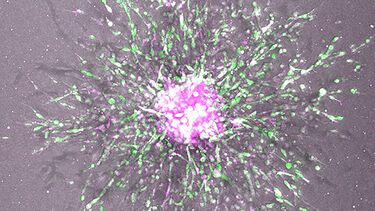- Discovery suggests that drugs designed to block ADAMTS5 could potentially stop or slow the spread of ovarian cancer.
- This research could lead to more effective treatments for women with advanced ovarian cancer.
- Scientists now have a clearer picture of how ovarian cancer spreads, which could help develop other new therapies.
A new study has identified the protein ADAMTS5 as playing a crucial role in the spread of ovarian cancer cells, offering a potential new target for future treatments.
Research led by Dr. Elena Rainero demonstrated that ADAMTS5 is significantly elevated in ovarian cancer tumors. Further investigation revealed that the protein Rab25, associated with advanced stages of ovarian cancer, directly increases ADAMTS5 expression.
ADAMTS5 functions like a pair of scissors by cleaving proteins within the extracellular matrix (ECM), the tissue surrounding tumors. This process creates pathways that enable ovarian cancer cells to migrate and invade other tissue. The research team found that inhibiting ADAMTS5 in laboratory models effectively prevented this from happening - stopping the spread of cancer cells.
We are very excited about these findings and we are currently testing drugs that block ADAMTS5 function. These could potentially be used in the future to treat patients with ovarian cancer.
Dr Elena Renairo
School of Biosciences
Ovarian cancer is a very aggressive form of cancer with a high mortality rate, largely due to late-stage diagnosis and aggressive metastasis (spread of cancer cells). By identifying and understanding how ADAMTS5 facilitates cancer cell migration, the researchers have pinpointed a potential therapeutic target. This breakthrough offers the possibility of developing drugs to inhibit ADAMTS5, thereby slowing or preventing the spread of ovarian cancer and improving treatment outcomes for patients with advanced disease.
The paper is available here.

